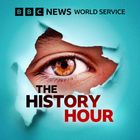
The History Hour
Aug 29, 2025
Max Pearson presents a collection of the week's Witness History interviews from the BBC World Service.
We learn why the Mount Pleasant riots erupted in Washington DC in 1991, and hear from our guest, Sarah Jane Shoenfeld, a public historian of the US capital.
Plus, more on John Lennon’s benefit concerts at Madison Square Garden in New York, his final and only full-length solo shows after leaving The Beatles.
And the story behind how the world's first permanent international criminal court was created in 1998.
Also, when the internet security tool, Captcha, moved from an idea to a reality, and why a photo of Chile’s goalkeeper in 1989 exposed a cheating scandal.
Finally, a peak behind the scenes of the making of a noir film classic, The Third Man.
Contributors:
Victor ‘Lilo’ Gonzalez – Mount Pleasant resident. Sarah Jane Shoenfeld - public historian. Andrei Broder – computer scientist. Judge Phillipe Kirsch – chair of the Rome conference. Geraldo Rivera – TV journalist. Ricardo Alfieri – sports photographer. Angela Allen - production assistant.
(Photo: Capitol Building, Washington DC. Credit: Getty Images)

